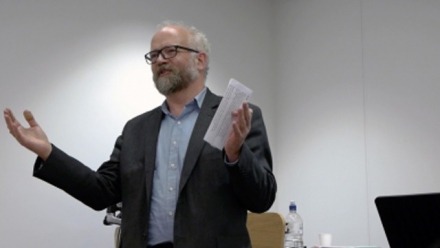Lecture | The imagination of Ada Lovelace: an Experimental Humanities approach - David De Roure

In over 200 years since Ada Lovelace's birth, she has been celebrated, neglected, and taken up as a symbol for any number of causes and ideas. This talk traces some paths the idea of Lovelace and her imagination of Charles Babbage's Analytical Engine has taken. In particular, we focus on music and creativity, after Lovelace's idea that 'the engine might compose elaborate and scientific pieces of music of any degree of complexity or extent'. This work began at a symposium in 2015 to mark the 200th anniversary of Lovelace's birth. Through collaborations with Pip Willcox (head of the Centre for Digital Scholarship at the Bodleian Libraries) and composer Emily Howard (Royal Northern College of Music), we have conducted a series of experiments and demonstrations inspired by the work of Lovelace and Babbage. These include simulations of the Analytical Engine, use of a web-based music application, construction of hardware, reproduction of earlier mathematical results using contemporary computational methods, and a musical performance based on crowdsourced algorithmic fragments. These digital experiments bring insight and engagement with historical scenarios. Our designed digital artefacts can be viewed as design fictions, or as critical works explicating our interpretation of Lovelace’s words, a means of close-reading. We frame this as Experimental Humanities.
Professor David De Roure is Professor of e-Research at University of Oxford. He works closely with multiple disciplines including social sciences (studying social machines), humanities (computational musicology and experimental humanities), engineering and computer science (large scale distributed systems and social computing). He has extensive experience in hypertext, Web Science, Linked Data, and Internet of Things. Drawing on this broad interdisciplinary background he is a frequent speaker and writer on digital scholarship and the future of scholarly communications. His previous roles include Director of the Oxford e-Research Centre, and Strategic Advisor to the UK Economic and Social Research Council.
This lecture is free and open to the public.
Co-Presented by Centre for Digital Humanities Research Humanities Research Centre Research School of Humanities and the Arts ANU College of Arts and Social Sciences.










